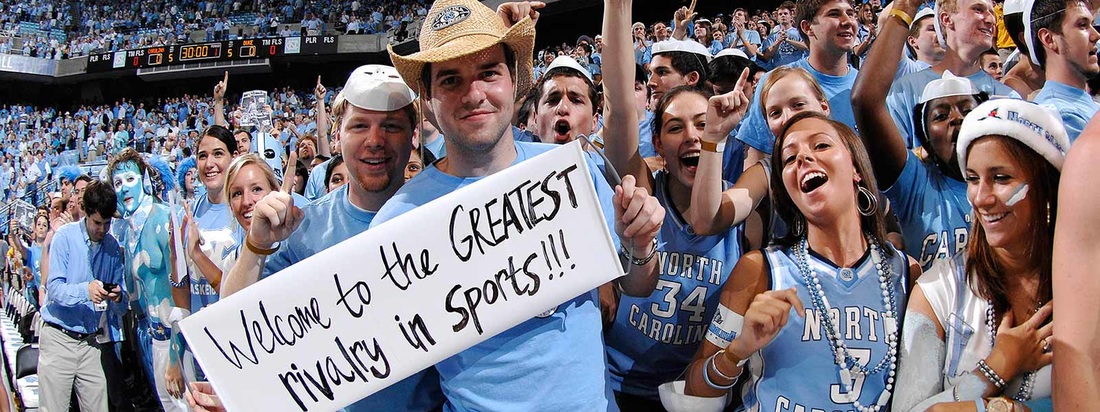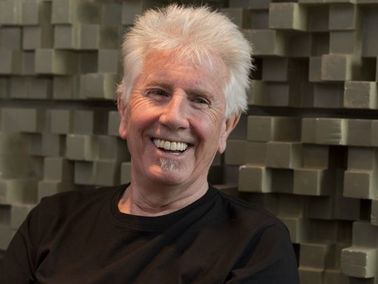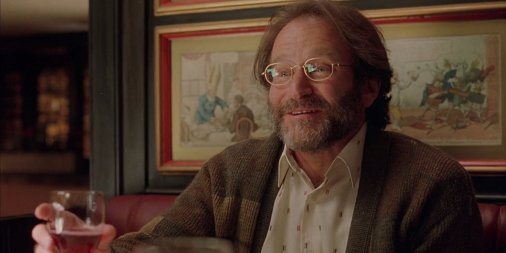|
Do sports and the HSP male mix well?
As I have gotten older, I have mellowed on my love all things related to University of North Carolina athletics. I never attended the school but was born in the state, Alumni via propinquitate. My children truly feared a Carolina loss, and often hid when they could see things going south. We laugh about it now, but I’m sure it was terrifying seeing the old man, rant at amplitude for a missed free throw or a squandered scoring opportunity. That was about as freewheeling with my emotions as I got. And I would let loose. Today, not so much, I am more tempered by age and realize, wisely, the going ons of twenty something athletes, is nothing to get bent up about. And in my reflection, I wonder, as an older HSP male, why I allow this to happen in the first place. After all what is a fan, but an emotional fanatic? As sport fans, HSP or non-HSP, we are tragically tied to the fates of our teams. I mean, a fan is a fanatic and typically emotionally vested in the outcome of their favorite team’s performance. We all become emotional; we all channel the inner HSP, full of rich, deep and strong emotion viewing our sporting event of choice. Of course, fueled by alcohol or some other such social lubricant, we can intensify that emotion, making the small fan into a large and emboldened FAN. As HSMs we can overcome our reluctance for emotional public display, by joining in with others, like minded fans, shout and scream, rant and rave and feel like part of something bigger. Perhaps for some HSMs the roar of the crowd, the rowdiness of seatmates, the blaring bands, the PA blasting is a bit much in person, but safer to follow on the big screen at home, with the touch of a remote control. Even still, I have often found that moments of heart pounding sports action, can find me slipping into another room, waiting on the outcome, signaled by the crowds roar or silence, to clue me in on the outcome. Not being able to watch is throttling my support, I suppose, but makes it easier. Nevertheless, being a fan can be linked to feelings of well-being, happiness, less loneliness and isolation, by giving you community, a common communication language, an inner generational connection, and the freedom to express emotion in public with reckless abandon, especially for men. Maybe even more so for HSMs. Following a team is like begin in love, n'est-ce pas? It really is like being in love. The range of emotions is almost identical. Up and down with a team’s fortunes, heartbreak and ecstasy, winning and losing, sometimes all in a neat two hour drama or a months long season. And at the end of the season, if your team makes the final round of action, you either soar into the following year with a victory or you sink with disappointment in a loss that lingers and is re-triggered with every Sportscenter highlight or YouTube video clip. It can be agonizing. So why would an HSM male, put themselves through this. Typically, we are not the best athletes. We are not often drawn to competitive sport, as players or as viewers (alright maybe more of the latter). Why do some of us do this? A place to vent, be aggressive and walk out with all of your teeth / or releasing the beast within. Like most young males, HSM males, are socialized into sport. It is the manly thing to do, to engage in competition, to test our strength against other males, to foster the warrior within and to progress towards a masculine archetype, defined by our culture. It is the staging area to grow the ambiguous boy and transform him into the man society expects him to be. Right. Sport, especially in America is a place to vent, to be aggressive and to release the inner beast within – doing it in nice timed quarters, with zebra shirted referees, and then to return to the real world as a hero, or at least role model. Again, right. The paradox of watching violent sports and being a sensitive male. As HSMs we generally refrain from violence as a first resort, but watching particularly violent sports, such as hockey, football and even baseball would seem to be the antithesis of what HSMs would find entertaining. But you can’t take the HSM out of the context of the culture we reside in. In America, football is religion, and no one can say this sport is not about snot knocking violence. As fans we hoot and holler about a great hit, a bone jarring tackle or a bruising run by a halfback. And many studies have shown that violence modeled even for adults watching away from the action, can lead to violence away from the game. Where does that lead HSM sport fans? Is this some vestige of our early childhood training? Are we proving our manhood by watching or participating in such games or are we simply getting along to save face with our male cohorts? It would seem not to make sense, but I know there are many among us, myself included that pass through this ritual every Fall. As George Orwell describes it, “Serious sport has nothing to do with fair play. It is bound up with hatred, jealousy, boastfulness, disregard of all rules, and sadistic pleasure in violence. In other words, it is war without shooting.” How can we not be affected by it? Where is the balance? Does sensitivity affect athletic ability? As for the athletes involved, how many of them are HSMs? If HSMs are twenty percent of the population it stands to reason, that there has to be some of the college and pro athletes representing. And if so, how does that affect their sports performance? Does criticism mess with their heads, hence impacting performance? Do they get TOO emotional during losses or during stages of defeat that would impact the team? Or are they more passionate, more driven, and more conscientious about their game and tend to excel? I can’t imagine there being any mutual exclusivity to being sensitive or highly sensing and athletic ability. In fact, many top athletes are not above showing that sensitivity in reflection of a completed game/match/meet. I would point to athletes that show a great deal of passion and compassion, as possible HSM model athletes – Michael Jordan, Tim Tebow, LeBron James, and Tiger Woods. I still love sports. Regardless, of where you stand on this topic, since HSM males are a wide spectrum, and yes I believe that HSPness goes from moderate sensitivity to extreme sensitivity, we males can fall out anywhere on that strata. I can’t speak for the whole, but I can say for me, I still love sports. I play less of the team variety these days, but love to participate when I can. I do watch my teams and vicariously enjoy their success and failures. I does put me in touch with something greater, a sense of belonging (even remotely), and I do relish that. But, I do wonder sometimes, how I can be so variegated with HSM interests – art, music, writing, spirituality and enjoying the natural wonders around me; and still be drawn to combative, competitive, and yes, sometimes violent world of sports. Perhaps, it’s my blood type – type O. A friend told me that type O is an ancient hunter-gatherer blood type. Maybe that predisposes me toward some instinctive bloodletting activities. Who knows. I know this, I’ll be tuned in this Saturday for college football, my day to raise hell and ride that wild roller coaster of emotion. As we used to say in the South, see ya’ll there. Go Heels! Thanks for dropping by, until next week… References: www.huffingtonpost.com/2015/01/30/sports-fan-mental-health-benefits_n_6565314.html www.ukessays.com/essays/psychology/effects-of-violence-in-sports-psychology-essay.php www.wbur.org/cognoscenti/2014/03/18/sports-violence-psychology-leonard-l-glass https://www.psychologytoday.com/blog/the-shrink-tank/201201/the-crying-game-male-athletes-shedding-tears
1 Comment
The Highly Sensitive Male and politics – where do we gravitate towards? This has been an incredulous political season. All manner of politicians and non-politicians have cast themselves into the political fray to run for office. Particularly interesting has been the run for the presidency. I have never seen such a time of political backstabbing, muckraking, out right lying - with no consequences, and general political nastiness, unseen by my eyes in, well, forever. No one wants to discuss real issues, no one seems to care. It’s all about showboating the TV ratings with outrageous claims and stunts. HSPs hate this crap. Because of our empathic nature we hate seeing people, regardless of their political views, get their asses handed to them on a platter during a debate. It’s unpleasant, unsettling and unsavory. Most of us just tune it out. It offers no value, no redemption, and no reason to focus our attention. In fact, it’s very embarrassing. Yes, we are embarrassed for the country. So where do HSMs tend to gravitate politically? I don’t have any study, survey or empirical evidence for this, but I surmise we lean mostly towards the party that shows the most heart. We are a liberal leaning, progressive thinking lot and would likely hang out with folks that shared our joint, collective empathy towards our fellow man and the planet. That’s just not sounding Republican or Libertarian to me. The highly mythical Empathic Party or what is red and blue with a little bit of green? If there did exist a political party that HSPs would find most appealing it would be, perhaps, a lot blue, maybe some red (he ducks) and a little green. This would be the Empathic Party, a fictitious collection of people that actually gives a damn about the population of this country, and I mean the entire population of this country. This used to mean the Democratic Party, the party of the people, the party of equality, the party of the middle class. Thanks to Bernie Sanders, we may be getting that party back. The state of our country since Reaganomics – the rule of the Reptilian class So what happened? In a word, Reaganomics. The election of Ronald Reagan in 1980 completely changed the dynamic of political discourse in this country. The civility and bipartisanship of days before were promptly washed away and a new political agenda was foisted on the American populace. Ronald Reagan, a make believe cowboy rode into town and with him a gang of elitist, reptilian brained operatives began to use the politics of survival and made politics no longer a profession of discourse and debate, but rather guerrilla warfare. Do you remember Lee Atwater? How about the manipulation of media with Roger Ailes? This strategy shutdown an era of sensible politics and occasional collaboration from both sides of the aisle. From here on it was war. Character assassination was the new norm. Political intrigue devolved into the swampy depths as opponents were branded as un-American for disagreeing with the new jingoism of the Reagan era. The destruction of the middle class had begun, as with the diminished role of government as a moderating force against greed and self-aggrandizement, the big wheels ran amok. I won't continue in too much more depth about the after effects of the Reagan regime, but I think you can easily turn on the television and see the results for yourself. This move towards, what I term, reptilian politics, is really about where the focus of political thought originates. It is clear to me that most of this “thought” emanates from the reptilian part of the human brain, the part that focuses on raw emotion, on survival of the individual, and the destruction of anything that gets in the way of that motive. You can cap that with intellectual neo-cortex rationalization and make it look like its deep and important, but in the end it’s the same driver that has kept us in a regressed mode for millennia. The consequences of which are damage to ourselves, our climate and to our future. Think: war, poverty, famine and concentration of wealth in the hands of the most powerful and greedy individuals. This has led us to our most current crisis – an Empathy Deficit Disorder. We are growing less and less empathetic and it shows in our politics. I mean really, Donald Trump is polling about forty percent of the population, and probably many more who can’t or won’t admit that he represents their beliefs. We are in a serious crisis. Where HSMs and HSPs can make a difference In a 2014 Pew poll about empathy in politics, liberals and conservative were asked about how important certain values were to teach to children. Conservatives focused on religion, obedience and hard work. Liberals cared more about tolerance, empathy, curiosity and creativity. These are traits mostly shared by HSPs and are characteristic of individuals with a high degree and capacity for empathy. This would include, of course, highly sensitive males. Although we make up only twenty percent of the population, HSPs need to make our voices heard. That’s hard for us, especially in this combative political climate. But we are that ocean wave powerfully and relentlessly smashing against the rocky shore. Gently shaping and altering the landscape of the shoreline, with persistence and consistency. It does not require that we change the world immediately and drastically, but our influence can be gentle, yet powerful. Through our art, our words, our wise counsel and the emotion that empathy brings. Sometimes a whisper is as effective as a shout, when heard in the right ears. This is where the mammalian brain kicks in. The emphasis is on the collective as opposed to the often selfish motivations of an individual only focused society. The collective society focus is greater in terms of survival of the species than the almost desperate reptilian need for individual survival. Fulfilling the evolutionary mission Our purpose (HSPs) is to warn the species, to calm the impulsive and reckless warrior heart and offer good counsel to our leaders, and, to be good stewards and leaders ourselves when placed in those positions. We are the balance and the early warning system for the species. We are the canary in the mind shaft. It is not a trivial responsibility. Future generations may depend on our reining the havoc wrecked on our society by one dimensional policies that disregard the future, for the ever present quarterly result. This is a madness that can be tamed with the aid of the collective wisdom of our HSP males and females. It’s time to gently kick some shit around and make ourselves noticed. A shout out to Graham Nash, an HSM with political integrity As a last thought, to honor a political activist, musician and a gentle man, Graham Nash, whose song Chicago was a anthem to sixties protest and activism, I tip my hat to you. I have always found your songs to be simple, heartfelt and meaningful and apropos for that moment in time you penned them. But we all know now that they are timeless, as is the case with most art that reaches down into the soul with a message. You have always shown political integrity and you are a man of your word. And a model for all HSMs out here. Thanks for dropping by, until next week. References: www.salon.com/2014/04/19/reaganomics_killed_americas_middle_class_partner/ consortiumnews.com/2013/10/17/the-abject-failure-of-reaganomics/ consortiumnews.com/2011/09/20/the-dark-legacy-of-reaganomics/ aattp.org/the-lie-of-reaganomics-robert-reich-blasts-the-failed-idea-thats-totally-destroying-the-middle-class/ www.thomhartmann.com/users/lightshipclear/blog/2010/11/how-you%E2%80%99ve-been-bamboozled-reaganomics-0 www.huffingtonpost.com/douglas-labier/americas-continuing-empat_b_637718.html www.psychologytoday.com/blog/our-humanity-naturally/201603/beware-americas-shocking-loss-empathy  Life as a hopeless romantic I admit it, I’m a hopeless romantic. But as love lives go, mine has been less than spectacular. As of late I have come to wonder is there something innately, hopelessly and yet ineptly romantic about my approach. Is it my selection of femmes or femme fatales; or, at a core level is it my personality type that drives me towards and recklessly into these failed liaisons. I appreciate the chase, I enjoy the anticipation of the reward and love the women, but somehow several broken relationships later, two failed marriages and now a lack of explanation in my choices, and I wonder how hopelessly romantic can one get. How does being a highly sensitive male, play a role in all of this? Let’s see. Getting what you want or getting what you get In the pursuit of love, one either gets what one wants or gets what one gets. In other words, how much does fantasy versus reality play into the entire mate getting game. I have always felt that who we are attracted to is largely an unconscious decision, most of which is a product of our environment, our culture and perhaps our DNA. Chemistry as they say either happens or it doesn’t. Love experts, say that we should be as specific as possible about what we want, but it is what we desire that often drives our decisions. And that, again, is largely deeply buried under the hood. What we want and what we desire, are often in opposition. With that said, how does this effect strategy in the pursuit of love? Well, for most men, especially most non-HSP males, this is simply a law of averages, zero sum game. You pursue as many females as possible, and at some point, your mate magically appears in your life. I mean, you take your lumps, and you move on. Sometimes you get what you want and sometimes you get what you get. For HSM’s because of the way we experience love, this strategy has to be balanced a bit differently. The rise and fall of the romantic arc Because HSMs feel emotions more deeply, with deeper expectations and if things don’t work out-- deeper heartaches, HSP males must expect that to risk more in love, one understands that the joy, the hurt and the possible ecstasy will be greater than perhaps any other emotion we feel. This is the romantic arc that we are all bound to, but often is more difficult for HSPs, male or female, to deal with in love matters. As Dr. Elaine Aron suggests, it is important to develop some emotional regulation to help moderate the often roller coaster like ride along the arc of love. The Female paradox Compounding things even more is what I call the female paradox or even the female prerogative. And I know this is going to be controversial, but, women often state in surveys that what they expect in a mate, especially a male mate, is this sensitive, feeling guy that is honest, passionate, romantic, kind and with a great sense of humor. Sounds great so far, doesn’t it? This is almost a perfect template for an HSM. But, as I’ve often found out the hardwiring for the female ideal looks more like a Neanderthal: muscular, confident, aloof, with arched brow, built for the hunt and dressed in white armor. The paradox still lives even in modern times. That leaves HSP males getting to play the role of empathetic brother, rather than champion or lover. I don’t fault women for this hardwiring, but recognize that for HSM’s looking for female affection, one is going to have to look much longer and be more selective to find a compatible mate. One that gets you. Looking for love or letting love look for you So where does one look for love if you are an HSM? Online dating sites are really popular right now, but rarely are there any sites that can take into account the HSP personality type. Because HSPs are very observant and can ferret out nuances in information, you might expect that we would be good at the selection process on dating sites. However, my experiences have been less than satisfactory. We as HSPs are often drawn to people who are not necessarily good for us. For example, we tend to gravitate towards people with problems, part of our empathetic personality type. And, to compound this, people with problems are drawn to us. Not exactly a recipe for success. This can be very draining, very frustrating and a prelude to heartache. Dr. Judith Orloff describes these emotional vampires, as people who will take advantage of our empathic nature, and pretty much suck the life out of us. The odd thing is that we will often allow this to happen and will perpetuate the idea that we can somehow change these people. Of course, we can’t, and although it makes for good sport, it always ends in some type of epic failure. In the end, sometimes it’s best to let love look for you. Live your life, pursue your passions, hang out with people that make you feel comfortable and appreciated and at some point, you will be found. Where HSM men go wrong As HSMs we often shoot ourselves in the foot or as it were the heart. Things that we do wrong are: expecting romantic overtures to always be welcomed (incurable romantic); not fully understanding the male/female dynamic in all of its complexity and paradox; not projecting confidence or shall we say showing our inner Neanderthal; confusing our emotions and sometimes being too external with them too early in the relationship, which of course, drives women crazy. Again, this requires some self-restraint and self-regulation. The key is to be aware and mindful of the myriad of emotions you are feeling. Met them out appropriately and cautiously and only to those that can appreciate your passion, your intuition, and your big heart. And if it does happen, the big rejection – allow yourself to grieve the loss, learn from the mistake, take time to be with yourself and regroup. Let that angst squeeze out of you, without depleting you. Of all men, you will recharge again soon enough, more so than most. It is your nature and your life. In defense of great loves This is not to say that HSMs are doomed to failed loves. I really believe in great loves. We often settle for less, thinking there is no better. And perhaps, for most of the population this will do. But as an HSM and a hopeless romantic, I am holding out for that great love, regardless of when she shows up in my life. I know she’s out there. As one who loves deeply, I will need to find one that also can receive that kind of love. That can handle it. She doesn’t have to be an HSP, and frankly, it would be in both of our interests that we are not alike completely. It adds to the edginess of love, the spark, the passion and bonding of the yin and the yang. Someday… Thanks for dropping by, until next week. References: http://hsperson.com/alanis-morissette/ http://www.drjudithorloff.com/_blog/Dr_Judith_Orloff's_Blog/post/celebrating-the-highly-sensitive-man https://www.psychologytoday.com/blog/sense-and-sensitivity/201509/looking-love-hsp http://www.menshealth.com/sex-women/top-20-traits-she-wants  It was about ten years ago, when I first heard about the Highly Sensitive personality type. All of my life, I had no idea that there were others like me out there. I just considered myself to be this lone aberration amongst men, a quiet, sensitive, nice guy. I grew up in the Southern United States, perhaps, the last bastion of macho manhood, where boys are expected to be men, even when they are still boys. My formative years were rough on my ego and left many lasting scars. It was difficult at best for a young, impressionable boy to assimilate in a culture that prided itself on raising young Clint Eastwood prototypes. But, what is this personality type? According to Dr. Elaine Aron, highly sensitive people or HSPs, are highly sensing individuals that are easily overwhelmed by excessive stimulation, are often creative and artsy, intelligent, highly observational and can seem withdrawn, overly sensitive or shy. The likelihood that you are an HSP is about 20% and the distribution among HSPs between male and females is about 50%. Being an HSP male does not mean that you are effeminate or gay, or weak or even introverted, its simply means that you are highly sensing. In fact, I’m not sure I resonate with the nomenclature for HSP, since our culture attaches a stigma to being too sensitive, especially for males. Many HSPs have become some of our greatest leaders, our leading artists (in all media), they are philosophers, religious/spiritual leaders and provide great counsel to the other 80% of the population. Dr. Aron states that there are evolutionary reasons for HSP representation in the population, often to aid in protecting the larger group/species, because of the innate cautionary nature of HSPs and our ability to detect danger in the environment. This is also true among animal populations as well. Nevertheless, this trait is not always valued in human societies. It is apparent in modern, Western culture that these set of characteristics are mostly seen as feminine, even perhaps, eschewed as weak and ineffectual. Not to be gender biased, but HSP females tend to be more highly regarded, than HSP males, and that puts an undue pressure on men with this personality type. Being an HSP male, makes one more vulnerable to criticism, humiliation, bullying and ostracization. Trying to fit into the larger culture of males, can be a source of self-doubt and self-loathing, which is only amplified by the HSP trait of enhanced internal sensing. This is not a good recipe for a happy, well adjusted individual. Now this is not to say that all HSP males are destined to lead a depressing, lonely life of isolation and shame, but since we are just now getting a handle on the trait and its expression in men, the much needed support is often spotty and limited. One of the reasons for this blog, is to discuss my experiences as an HSP male and to share how I cope with often not fitting in and how I am growing to accept my trait and fully utilize it in my life. I’d like to end on an observation of mine that came to light at the death of comedian Robin Williams. As Williams was one of the most innovative and original comics of my generation, I naturally followed his career in TV, standup and film. There was always a nervous uneasiness about Williams that I sensed came from an underlying sensitivity, that belied his external persona. In interviews, he seemed to use his comedy to mask his true feelings and like a magician, use humor as sleight of hand. He was masterful at this, and of course audiences loved it. Underneath I sensed there was something deep and insecure below the surface. It became apparent to me in his dramatic roles in film that he gave himself permission to release that superficial mask and unveil a masterful and sensitive actor. His acting came from his heart and his performances were genuine and brilliant. I believe his greatest gift to all of us, was his dramatic depiction of real humans, with real feeling. His work in Good Will Hunting, Dead Poets Society, What Dreams May Come, and others, were simply works of art. He was a brilliant, if not tragic representative of what an HSP male can become. Now I don’t know if his sudden death, was a result of an overwhelm within his sensitive personality or whether the cause was more prosaic, caused by the disease he was suffering from, I do know, that I like many others, mourned his death as I felt we lost an HSP brother and spokesman. Finally, the world needs more men that are HSP males to rise up and own their highly valued traits. As Dr. Ted Zeff says HSP males need to empower themselves and help save this planet from a runaway warrior class, of non-HSP male dominated leaders, who rarely take counsel from the priests, artists, philosophers and thoughtful people who nature put her to guide and moderate. We need to retake our emotions, our feelings and our powerful observations and present them in ever changing ways before it’s too late. Each week, I’ll discuss another topic about HSP males. Thanks for dropping by and until next week… References www.huffingtonpost.com/entry/robin-williams-mrs-doubtfire-deleted-scenes_us_56bc9fd8e4b08ffac12408b5 www.huffingtonpost.com/mark-liebenow/lost-to-suicide_b_11285484.html? highlysensitive.org/highly-sensitive-people-and-depression-overstimulation-may-lead-to-depression/ http://hsperson.com/suicide-and-high-sensitivity/ |
AuthorBill Allen currently lives in Bend, Oregon. He is a certified hypnotist and brain training coach at BrainPilots.com. He believes that male sensitivity is not so rare, but it can be confounding for most males living in a culture of masculine insensitivity which teaches boys and men to disconnect from their feelings and emotions. His intent is to use this blog to chronicle his personal journey and share with others. Archives
July 2024
Categories
All
|





 RSS Feed
RSS Feed
